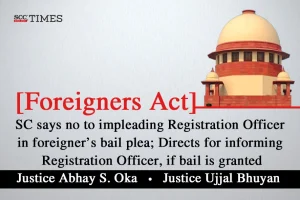Supreme Court: In a set of two criminal appeals, the Division Bench of Abhay S. Oka* and Ujjal Bhuyan, JJ. answered the issue that whether it is necessary to implead a Foreign Registration Officer appointed under Rule 3 of the Registration of Foreigners Rules, 1992 (‘the Rules’) in the bail application filed by a foreigner within the meaning of the Foreigners Act, 1946 (‘the Act’) in negative. The Bench opined that while releasing a foreigner on bail, the Court should direct the investigating agency or the State, as the case may be, to immediately inform the concerned Registration Officer appointed under Rule 3 of the Rules about the grant of bail so that the Registration Officer can bring the fact of the grant of bail to the notice of Civil Authority concerned.
The Amicus Curiae suggested that considering the powers vested in Civil Authorities under the Foreigners Order, 1948 (‘the Order’), it will be appropriate to direct that while considering the prayer for granting bail in case of a foreign national who is accused of serious offences, a notice should be issued to the Authority so that the said authority can be heard on the prayer for grant of bail and on bail conditions, in the event the Court is inclined to grant bail.
The Court said that under Section 3 of the Act, there is a power vested in the Central Government to issue an order making provisions either generally or concerning any particular foreigner or class of foreigners of prohibiting, regulating or restricting the entry of foreigners into India or their departure therefrom or their presence or continued presence. The Court also noted that in the exercise of the power conferred under Section 3 of the Act, the Foreigners Order, 1948 (‘the Order’) has been issued. Clause 2(2) of the Order provides for appointing a Civil Authority by the Central Government. Clause 5 of the Order deals with the power to grant permission to depart from India. Further, the Court said that under Clause 5(2), leave must be refused by the Civil Authority if it is satisfied that the foreigner’s presence is required in India to answer a criminal charge.
The Court added that under Clause 11 and other clauses of the Order, various restrictions can be imposed on a foreigner while he is in India. The Court stated that the said power is wholly independent of the power to grant bail and there is no order passed by the Central Government for giving effect to clause (g) of Section 3(2) of the Act, which confers a power on the Central Government to issue an order directing that a foreigner shall be arrested or detained or confined. The Court explained that even if such an order is issued, the power to arrest or detain a foreigner under the Act is independent of the power of the Criminal Court to grant bail. Notwithstanding the bail granted by a Criminal Court, the power to arrest and detain a foreigner can be exercised, provided the Central Government makes an order in terms of clause (g) of Section 3(2) of the Act.
Therefore, the Court refused to issue a direction that either the Civil Authority or the Registration Officer should be made a party to a bail application filed by a foreigner, or a notice of the bail application be issued to the said authorities, as the authorities under the Act and the Order have no locus to oppose bail application filed by a foreigner unless bail is sought where the allegation is of the offence punishable under Section 14 of the Act.
The Court also said that such impleadment of the Civil Authority or Registration Officer in all bail applications filed by foreigners may result in unnecessary delay in deciding the bail applications.
In addition to the directions passed on 08-07-2024 in Frank Vitus v. Narcotics Control Bureau, 2024 SCC OnLine SC 1663, the Court directed that while granting bail to a foreigner within the meaning of the Act, the Court concerned shall issue direction to the State or prosecuting agency, as the case may be, to immediately communicate the order granting bail to the Registration Officer concerned appointed under Rule 3 of the Rules who, in turn, shall communicate the order to all concerned authorities including the Civil Authorities. If such information is furnished, it will enable the authorities under the Act, the Rules and the Order to take appropriate steps in accordance with the law.
CASE DETAILS
|
Citation: Appellants : Respondents : |
Advocates who appeared in this case For Petitioner(s): For Respondent(s): |
CORAM :

